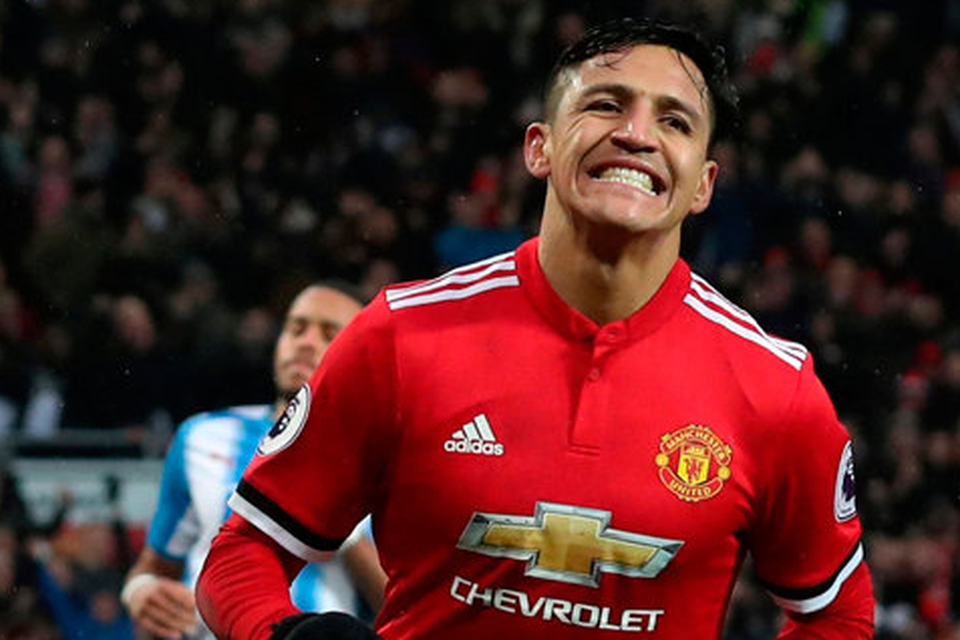Comment: Alexis Sanchez in fantasy land as soccer's currency floats over the rainbow
The Couch
Alexis Sanchez celebrates after scoring Manchester United's winning goal against Huddersfield yesterday. Photo: Scott Heppell/Reuters
Two weeks into his new gig at Old Trafford, half a million quid should have ghosted into his bank account by now. One wonders if Alexis Sanchez, laptop opened in the privacy of his new living quarters in Manchester, was tempted to log on, just to see if the first week's £250,000 had actually dropped. And having seen the magic digits, that he took a screen shot on his mobile phone and texted the surreal image back to his mother in Chile.
"Top of the world, ma! And there's plenty more where that came from!"
Or maybe the great little man long ago became blasé about all those multiplying noughts in his stupendous electronic deposit book. His ten years as a pro at Udinese, Barcelona and Arsenal had already made him a millionaire 20 times over. So maybe even a man who was once a fatherless boy playing barefoot on the rubble streets of Tocopilla can get used to being as rich as Croesus, the ancient Greek king who slept on beds of gold.
Now 29, his four-and-a-half-year deal with United makes him the highest-paid player in the Premier League. Not having to pay Arsenal anything apart from the Armenian makeweight Henrikh Mkhitaryan, meant that United could take an industrial leaf-blower to Sanchez and submerge him in clouds of floating bank notes.
The bald headline figure for his weekly salary was £500,000, before tax. One financial expert specialising in the sports industry reckoned that a 45 per cent tax rate would leave Sanchez's net monthly payment at £916,000, or around £11m per year. But other reports put his annual net take-home tranche at £12m or £14m. It was also speculated that his 'signing-on' fee was worth £20m alone, although these guestimates didn't specify whether this would be an additional bonus or knitted into the prior salary agreement. There was further speculation about extra gravy still, in the form of image rights and various add-ons for goals scored and team points accrued.
Given the scale and complexities involved, it's quite possible Sanchez himself doesn't know precisely how much he will earn in the coming years. A stray million here or there won't make a difference to the quality of his life now.
And in this world a million quid has the weight of a fiver out in the actual world of Tocopilla or Salford or Brixton. Indeed, as the noughts seemingly self-replicate with every passing transfer window, there is a sense that money itself has become meaningless within the global sports-entertainment complex. It seems to have no value until it reaches a certain threshold, that the counting begins not at one but one million, that coins and pound notes are as obsolete as the clay tablets that were used for trading in Mesopotamia 4,000 years ago.
The money that cannot be touched, felt or smelled, those immaterial digits on the computer screen, have deeper substance than the cash tangible in pocket or purse. And the more weightless money becomes, the more it can defy gravity. When Neymar was sold by Barcelona to Paris Saint-Germain for a world record £198m last August, the money in the global game floated further into the stratosphere. With the current rates of galloping inflation it will soon disappear over the rainbow.
And there it may soon catch up with the NBA, which is already sailing towards interstellar space. According to their 2017 global salaries survey, the website sportingintelligence finds that pro basketball players in America are on average the highest-paid sportsmen on the planet. Major League Baseball is next. Seventeen of the top 20 paying franchises in all of sport are in the NBA. The three outsiders are Barcelona (in fourth place), PSG (fifth) and Real Madrid (ninth). The number one team is Oklahoma City Thunder, which pays its roster a combined weekly average of £7.15m, or £137,507 per man per week.
Manchester United were deemed to be in 23rd place overall, paying an average of £100,792 per man per week. Sanchez is earning a multiple of that average. The highest-paid NBA player is Steph Curry of the Golden State Warriors; his gross salary is $34.68m; ESPN calculates his net at $15.2m, roughly £10.75m. Which means the highest-paid player in the English Premier League is more or less earning the same as his NBA counterpart.
And, of course, Lionel Messi and Cristiano Ronaldo are in a different financial league to them both.
Jonathan Meades, the English intellectual, art critic and occasional television interloper, once said that the generation of Matt Le Tissier, the 1990s Southampton FC folk hero, was the last wave of footballers with whom he could identify. "Now, once a week," Meades famously declared, "a bespoke cast of gladiatorial yobs, gods and Wag-roasting Croesus kids descend in tattooed Lamborghinis from their Parnassian blingsteads to run around for 90 minutes of bravura vanity."
Sanchez by all accounts is good to his mother Martina, a heroic woman who cleaned houses and gutted fish to provide for Alexis and his three siblings. He is good to Tocopilla too, a ramshackle port town, polluted by industry and the dust of an arid region that includes the Atacama desert. For years he would return home every Christmas and lead a cavalcade through the streets, showering people with presents along the way. He has financed local football pitches and other initiatives too. A street is named in his honour.
It is the classic rags-to-riches sporting fairytale. "I'd say to my mum," he told Spanish newspaper El Pais in 2013, "'Don't worry, I'll be a footballer and everything will work out, we'll have money', and she would laugh."
But this much money? It was surely a fantasy too far then, for it is still a fantasy now, even if the writing is there on the screen in a blizzard of zeroes.















